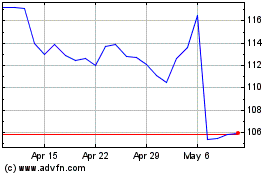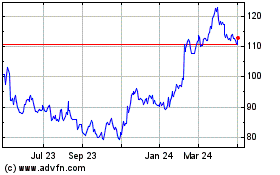By R.T. Watson and Allison Prang
Walt Disney Co. emerged as a formidable contender in a rapidly
escalating battle among online-video platforms, as the number of
subscribers to its new streaming service more than doubled in its
first three months.
Disney+ had 28.6 million subscribers through Monday, Chief
Executive Robert Iger said Tuesday, up from 10 million in November,
when the service launched.
"The launch of Disney+ has been enormously successful, exceeding
even our greatest expectations," Mr. Iger said on a conference call
discussing quarterly financial results.
He said the service's trove of older programming, ranging from
classic Disney movies to 30 seasons of "The Simpsons," has been as
popular with subscribers as what he characterized as a modestly
sized library of new, original content. About 65% of Disney+ users
who watched "The Mandalorian," the buzzy new Star Wars series,
watched 10 other movies or shows on the service, Mr. Iger said.
During last Sunday's Super Bowl, the studio teased a spate of
forthcoming Marvel series like Captain America spinoff "The Falcon
and the Winter Soldier," which debuts in August, and "WandaVision"
in December. The next season of "The Mandalorian" is to begin in
November, Mr. Iger said, while the company develops other Star Wars
series based on Obi-Wan Kenobi and Rogue One.
The company's fledgling service is already competing with
Netflix Inc. and Amazon.com Inc., in addition to Apple Inc.'s
recently launched Apple TV+. But later this year the crowd will
become more crowded with the planned launches of Comcast Corp.'s
Peacock and AT&T Inc.'s HBO Max.
It took Netflix, the largest streaming platform, significantly
longer to reach the number of subscribers Disney+ acquired in three
months. Netflix started offering streaming in 2007 and created a
stand-alone streaming plan in 2010. But it didn't cross 28 million
subscribers until late 2012, according to its financial
statements.
In Netflix's early years, cable TV subscriptions were still
growing and cord-cutting hadn't gained momentum. Now, the pool of
potential streaming customers is much larger. Still, Disney is also
competing in a more crowded field than Netflix was early on.
Netflix now boasts 167 million subscribers.
Disney+ costs $6.99, versus the $12.99 Netflix charges for its
most popular plan.
Subscribers can bundle Disney+ with ESPN+ and Hulu -- also owned
by Disney -- for $12.99 monthly.
Mr. Iger said about 20% of Disney+ subscribers signed up through
a partnership with Verizon Communications Inc., whose
unlimited-data customers are eligible for a free year of the
streaming service.
Disney made its foray into streaming partly as a response to
concerns that surfaced on Wall Street in 2015 after the company
suffered subscriber losses at its highly profitable ESPN division.
Shares fell as investors worried about the long-term effects of the
company competing with Netflix.
Although most Disney+ subscribers are in the U.S., the service
is also available in Canada, Australia, New Zealand and the
Netherlands. Disney+ begins piping content into homes in the U.K.
and some European countries like France and Germany in late March.
Mr. Iger said the service would become available in more European
countries, including Portugal, this summer.
At the company's film division, revenue and profit more than
doubled compared with the same period a year earlier. "Frozen 2"
and "Star Wars: The Rise of Skywalker" both had strong box-office
openings before each going on to gross over $1 billion globally.
Disney made more than $11 billion at the global box office last
year, beating the record $7.6 billion, which it also set, in
2016.
Mr. Iger said it would be difficult this year to keep pace with
that performance. The 2020 slate includes two Pixar titles, two
Marvel titles and the live-action remake "Mulan," due in late
March.
Disney's shares were essentially unchanged in after-hours
trading as earnings beat analysts' predictions.
The company said domestic attendance at its amusement parks
increased during the quarter, with spending among visitors rising
10%. But Disney finance chief Christine McCarthy said the company
was bracing for losses in Asia after closing down its parks in
Shanghai and Hong Kong amid the coronavirus outbreak that has
rocked the region.
The company estimates that if Shanghai Disneyland remains closed
for two months, the financial impact could be about $135 million,
she said. A closure in Hong Kong of the same duration could cost
Disney about $40 million, Ms. McCarthy said. Combined with
attendance declines related to political unrest in Hong Kong, she
said, the total financial impact at that location could be around
$145 million over two months.
Disney reported net income of $2.11 billion in the first
quarter, or $1.16 a share, which fell from a year earlier. On an
adjusted basis, earnings were $1.53 a share, compared with
analysts' estimate of $1.46 a share, according to FactSet.
Revenue across the company rose 36% from a year earlier to
$20.86 billion, slightly exceeding analysts' consensus of $20.76
billion.
That user base, which reflects the total as of Dec. 28, 2019,
came just months after Disney reported signing up 10 million
subscribers to its flagship streaming platform that launched in
November.
Disney's business line that includes Hulu, ESPN+ and Disney+
more than quadrupled its revenue, but reported a wider operating
loss compared with a year earlier. The head of the company's Hulu
business, along with Disney's head of its Twentieth Century movie
studio, both left the company last week.
Revenue in Disney's studio entertainment business more than
doubled. Operating income jumped to $948 million, up from $309
million. The company's films performed particularly well at the box
office in 2019, with seven cracking the top 10 world-wide,
including "Avengers: Endgame, " "The Lion King" and "Frozen 2."
Write to Allison Prang at allison.prang@wsj.com
(END) Dow Jones Newswires
February 04, 2020 19:14 ET (00:14 GMT)
Copyright (c) 2020 Dow Jones & Company, Inc.
Walt Disney (NYSE:DIS)
Historical Stock Chart
From Jun 2024 to Jul 2024

Walt Disney (NYSE:DIS)
Historical Stock Chart
From Jul 2023 to Jul 2024
